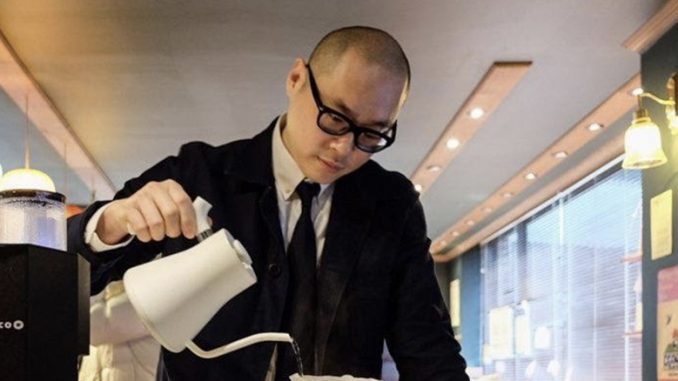
We spoke with BK, co-founder of Fritz Coffee Company, about his background in coffee and opinions on branding.
BY SUNGHEE TARK
SPECIAL TO BARISTA MAGAZINE ONLINE
Photos courtesy of Fritz Coffee Company
When I started getting more involved in Seoul’s specialty-coffee scene a few years ago, I was first introduced to Fritz Coffee Company as the “Avengers of Coffee.” Founded by five highly esteemed coffee professionals with years of experience, Fritz built up their reputation quite rapidly amongst other coffee professionals.
What was remarkable about Fritz Coffee Company was that it also grew a cult of followers among the general public, who at the time were new to specialty or “direct-trade” and “relationship-based trade” coffee. Behind the exceptional growth of Fritz was the brand identity with its iconic seal, often seen drinking coffee or eating bread, that gathered interest amongst an audience thirsty for great coffee paired with attractive branding. Over the past six and a half years of operation, the influence of Fritz’s brand identity only expanded beyond the coffee industry. They have collaborated with tech-giant Samsung and South Korea-based cosmetics company Hera. In 2018, Audi Korea, in partnership with Magazine B, chose Fritz Coffee Company as the most “Korean” brand in Seoul.
We spoke with BK Kim, the brand director, co-CEO, and co-founder at Fritz Coffee Company, to learn about his journey to coffee and input on branding.
Sunghee Tark: Your role within Fritz Coffee Company is quite impressive—you are the co-CEO and the brand director, but you also are a barista and a green bean buyer. Can you tell us a bit about your background? How did you get into coffee and how has your experience informed your current roles and responsibilities?
BK Kim: I started in coffee as a consumer. There was this coffee shop called Bohemian in Anam-dong that I frequented before I worked in coffee. I was a sports journalist at the time. The barista used to serve filter coffee using dark-roast coffee, and I frequented the shop as a customer until I started working as a barista at the same shop after a year. The company that I was working for at the time went out of business, and I sought a part-time job at Bohemian as a barista. That was my first career ever in coffee.
Looking back, it was also quite timely as I was reading books on fair trade and direct trade. I’m an activist at heart—and as a college student I used to actively partake in demonstrations against the corrupt government. With my keen interest in human rights, these books and coffee spoke to me. That’s when I realized perhaps coffee can be a vehicle that can contribute to create a better world. Quite ideal, but coffee, and barista as (a) job from the look of it, came as a big appeal to me as well (laughs), also because I didn’t understand the reality of the industry at the time.
So that was 2008, right? And you are one of the people who has led the growth of specialty coffee in Korea since then.
Perhaps you can put it that way. The person who I was working with at the time was Pil Seo, with whom a year later I started Coffee Libre. At Coffee Libre, we led the initiatives to introduce the concept of traceability in coffee because we wanted to better appreciate the product that we were consuming—and also to know the origin of products that we consume. With our interest to promote traceability, we started researching and learned that there were quite a few coffee brands outside Korea that were already on a similar path. So in the beginning of my coffee career, I traveled a lot—to learn about their experiences, and also to learn more about the coffee industry as a whole.
And I traveled to Nicaragua, the first origin for me, and met Yuko Itoi. She has been an incredible teacher since, and I have been so fortunate to have crossed paths with her. Back then, there was not much information about specialty coffee, especially in Korean, and she’s guided me to learn so much more about it.
That’s impressive. I want to switch gears a little bit here to chat more about Fritz’s branding. Fritz’s brand identity is unequaled; it is distinctly Korean, but I would like to call it traditionally chic, if I may. It is one of the few Korean brands in coffee that also has influence beyond coffee. What is your take on the role that brand identity, design, and/or branding have in the coffee industry?
When talking about branding, I like to divide it into internal and external branding. Many don’t think there is such a division—but over the years, I have realized that I’ve been doing that unconsciously. I think it is impossible to speak about branding, without speaking about internal branding, especially because so much of what a brand exhibits externally is a reflection of its members’ collective behavior.
What’s internal branding?
To us at Fritz, it begins with communicating what we believe in as a collective, how we work, and coming to an agreement that our members (colleagues) understand where we are all headed. Communication, therefore, is a key part of the internal branding. Phrases such as “9:01 is not 9:00” or “your colleague is your first client” may exemplify what we believe in. This is to say that there are so many ways that you can perceive the same thing, but our internal branding starts with the process of bringing everyone to the same page—the expectation for the job, brand value, and our shared goals. Hence, we spend quite some time on-boarding the newcomer (newly hired staff) through our version of “orientation training.”
We will continue this interview tomorrow.

ABOUT THE AUTHOR
Sunghee Tark is the co-founder of Bean Voyage, a feminist organization that collaborates with smallholder womxn coffee producers to build an equitable coffee value chain. She is also a freelance coffee writer, Specialty Coffee Association LEAD Scholar, and Re:co Fellow.

